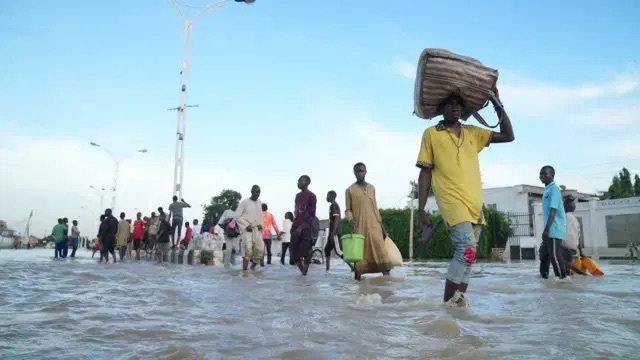Now Reading: Panic, Fears Over Flooding – The Sun, Nigeria
-
01
Panic, Fears Over Flooding – The Sun, Nigeria
Panic, Fears Over Flooding – The Sun, Nigeria

Raphael
More states issue evacuation notice to residents
Amid apprehension and tension, several states have issued evacuation warnings to citizens residing in floodplains following a fresh alert issued by the Nigerian Meteorological Agency (NiMet), an agency of the Federal Government.
The warning by the National Flood Early Warning Systems Centre under the Federal Ministry of Environment urged residents and relevant authorities to take urgent precautionary measures.
At least, 19 states are expected to experience heavy rainfall from August 5 to 9. According to the flood alert, rainfall is expected to trigger flash and riverine flooding across the country including Akwa Ibom, Bauchi, Ebonyi, Cross River, Nasarawa, Benue, Kaduna, Katsina, Kebbi, Kano, Niger, Plateau, Taraba, Jigawa, Yobe, Zamfara, Sokoto, Borno, Gombe, Bauchi, Gombe, Zamfara, Kaduna, Kano, Katsina, Sokoto, Kebbi, Adamawa, Taraba, Borno, Nasarawa, Kogi, Benue, Kwara, Plateau, Niger and the Federal Capital Territory.
Barely 24 hours after the alert, reports said flood has wreaked havoc in Ogbaru Local Government Area of Anambra, destroying houses, property and farmlands.
Executive Secretary, Anambra State Emergency Management Agency (SEMA), Mr Paul Odenigbo, disclosed that all the residents in water-prone areas were well sensitised about the impending flood that is expected this year.
Odenigbo said the state government had prepared a haven for those who would be affected by flooding, adding that personnel were on the ground to evacuate affected residents when the floods became unbearable.
He noted that this was the early stage, and the water would continue to rise daily.
“All water prone areas in Anambra were well sensitised about the flood situation, they are not taken unaware, and the agency is preparing its staff who work on the field to mitigate the flooding.
“They are also getting the holding centres ready, by preparing them, fumigating them and preparing them for occupation by people who are going to be affected by the flood, it’s a normal thing at this stage,” he said.
When asked if the people will not be adamant to evacuate to a haven, he explained that such resistance could happen with some residents, as the agency experiences it yearly.
“The high water is not a new thing to them, they have been living with it year in, year out, it’s not the way you are seeing it, they are seeing it, when you tell them to go, they just laugh at you, because to them, nothing has happened.
Efforts to get the reaction of the Anambra Commissioner for Environment, Mr Felix Odumegwu, failed as he did not pick his phone calls nor respond to the text messages sent to his phone.
28 Imo villages
Meanwhile, the National Emergency Management Agency (NEMA) has issued a flood evacuation notice to residents in Ogboru, Edeakamaya and 26 other villages in Ohaji/Egbema Local Government Area of Imo State.
Already, floodwaters have encroached into residential areas, with visible signs of submergence already affecting parts of the communities.
Other villages within Ohaji/Egbema Local Government Area include Olutu, Ipo, Eze Abacheke, Deyezegbe, Ogbede, Okishipai, and 27 villages along the waterfront in the Oguta Local Government Area.
The warning was shared via the official X handle (formerly Twitter) of NEMA on Tuesday night after a flood assessment in Ohaji/Egbema Local Government Area of Imo State following alerts from residents over rising floodwaters threatening communities and issued the warning.
Owerri NEMA’s Assistant Chief Search and Rescue Officer, Mr. Innocent Nweze alongside officials of the Federal Fire Service (FFS), Owerri Station, and representatives of the traditional ruler visited affected parts of the Abacheke community in the Ohaji/Egbema Local Government Area and observed that floodwaters had steadily encroached into residential areas, with visible signs of submergence already affecting parts of the community.
Nweze warned that with current water levels and seasonal projections, there was likelihood of more severe flooding in the coming weeks remains high and that community vigilance is critical.
“Local farmers had commenced early harvesting of crops ,many of which are not fully matured in a desperate attempt to salvage what they could before the floods destroy their farmlands.
“In Ogboru village, several areas have already been inundated, affecting key infrastructure including: Abacheke Primary Health Centre, religious institutions (notably The Apostolic Church), Salzan Industries, Community Primary School (already shut down in anticipation of the flooding).
“We urged residents of the 28 flood-prone villages including Ogboru, Edeakamaya, Olutu, Ipo, Eze Abacheke, Deyezegbe, Ogbede, and Okishipai to prepare for possible evacuation to higher and safer grounds.”
• Benue urges residents to relocate
Benue government has advised residents living along flood-prone areas to relocate to safer areas.
The Permanent Secretary, Ministry of Humanitarian Affairs and Disaster Management, Dr James Iorpuu, said in Makurdi that the government had also taken steps to mitigate the negative effects of the impending flood.
The permanent secretary advised those residing on waterways to immediately relocate to safe areas.
According to him, the government cleared all blocked drainages within the urban areas for easy flow of water.
Iorpuu, member of the Technical Committee on Disaster Response in Nigeria, said the government also launched e-emergency platforms on how emergencies are reported, analysed, and responded to.
He said the ministry had already written to the government requesting funds to take care of impending flood victims. Iorpuu, executive secretary of the State Emergency Management Agency, said the ongoing multi-billion naira Idye drainage was one of the proactive measures taken by the government to mitigate the impact of flood.
“I also want to use this platform again to appeal to Benue people to vacate flood-prone areas.
“They know themselves. Year-in-year-out, when there is a flood, they vacate, and when it is no more, they go back to their shelters along the river bank.
“Some have built their houses on waterways; we are begging them to vacate such areas. You also see what the governor is doing within the state capital, building roads and water channels for free flow of water.
“This flood is not only going to affect animals; it will affect human beings and farmlands, amongst others.
“We need to change our attitude on waste management too. You saw what happened in Adamawa a few weeks ago, so I am begging people to move to safe areas,” he said.
The government had already earmarked camps for would-be Internally Displaced Persons (IDPs).
•Niger, Kogi, Nasarawa unveil plans
Kogi, Nasarawa and Niger states have rolled out proactive measures to mitigate the effects of flooding.
In Lokoja, the Kogi Government said it was taking every precaution to prevent loss of lives and property during this year’s rainy season.
Mr Muktar Atimah, executive secretary of the Kogi Emergency Management Agency (SEMA), said the state has developed a comprehensive flood preparedness plan.
According to Atimah, the measures include collaboration between SEMA and NEMA to enhance staff capacity through workshops and seminars, the establishment of an emergency response framework, and the setting up of departments for search and rescue, Information Communication Technology (ICT), disaster risk reduction, and logistics coordination.
“We have also launched community sensitisation campaigns involving traditional rulers, religious and community leaders, as well as youth and women groups.”
He said the agency was engaging with Nigeria Inland Waterways (NIWA) to promote waterway safety.
He added that post-flood rehabilitation plans were underway to empower displaced persons after the rainy season.
In Nasarawa State, residents of flood-prone communities in Awe, Doma, Nasarawa and Toto LGAs have started relocating from high-risk areas.
Mr Benjamin Akwash, director general of the Nasarawa State Emergency Management Agency (NASEMA), said the move was as a result of the agency’s intensive early warning sensitisation campaign.
He said the campaign reached riverine communities such as Tunga (Awe), Loko (Nasarawa), Umaisha (Toto) and Doma town, and involved palace visits, local radio messages, and collaboration with disaster-response Ministries Departments and Agencies. He also revealed collaboration with local government councils to identify safe corridors and highlands for potential relocation.
Akwash said the state government had activated emergency kits including speed boats, canoes, and rain gear, and was working closely with disaster-line MDAs for efficient search and rescue operations if needed.
In Niger State, both NSEMA and NEMA have intensified flood preparedness efforts.
Executive Secretary of NSEMA, Mr Ibrahim Hussaini, said the agency has held stakeholder engagements and sensitisation visits to traditional institutions and town hall meetings.
Similarly, Malam Hussaini Isah, NEMA’s head of operations for Niger and Kwara states, emphasised the importance of translating flood preparedness messages into local dialects.
He underscored the need for early warning systems, evacuation to higher ground, and provision of shelter and relief items.
“By taking proactive measures, we can strengthen community resilience and minimise the impact of flooding.”
•Abakaliki farmers cry out
Rice farmers in Abakaliki have raised concerns over incessant rainfall, which they say is threatening the 2025 rice production and harvest.
The farmers expressed their concerns in separate interviews amidst persistent downpours that have led to flooding, waterlogging, and crop losses across major rice-growing areas in the state.
Mr Emmanuel Nwali, prominent rice farmer in Izzi Local Government Area, said nearly half of his rice farm had been submerged due to the heavy rainfall.
“The floods have destroyed most of our work. What is left is already turning yellow.
“It has been raining almost daily since mid-July. We may not expect a bountiful harvest this season,” Nwali lamented.
Another farmer, Mr Chinedu Okenwa, said he lost his nursery beds to flooding, resulting in the loss of major resources.
“I don’t know how to make up for the losses because, as it stands, I cannot transplant. The nursery has been destroyed.
“We risk poor yield this season, and that may cause a sharp rise in the price of local rice next year. We are facing a difficult period due to the weather, ”Nwali lamented.
Similarly, Mr Aloysius Njoku, a commercial rice farmer, said he had lost a large portion of his rice farm to flooding and feared the development would negatively affect the harvest.
“The rains and the attendant flooding have been so devastating. If nothing is done, rice will become scarce and expensive, and everyone will feel it,” Njoku said.
Mrs Sylvia Elom, a civil servant and subsistence rice farmer, expressed concern that the destruction of farmlands by heavy rainfall would impact many households that rely on rice cultivation for their livelihood.
“Rice is the major source of income for the majority of our people who are mainly agrarians. When floods destroy our farms, we are left with nothing,” she said.
Meanwhile, Dr Paul Onwe, private agricultural extension expert, explained that rice is highly sensitive to prolonged flooding.
He added that heavy rainfall poses serious threats to rice farms, especially those located in swampy areas.
He advised farmers to pay close attention to weather forecasts before embarking on rice cultivation, noting that the Federal Government provides early warning advisories at the beginning of each farming season.
“Submerged fields suffer from stunted growth, nutrient deficiency, and fungal diseases,” Onwe warned.
A source at the Ebonyi Ministry of Agriculture, who spoke on condition of anonymity, confirmed that the state government is tracking the effects of the current flooding on farmlands.
He added that the government was also compiling reports from affected areas for appropriate response.




